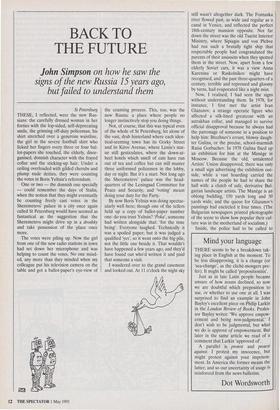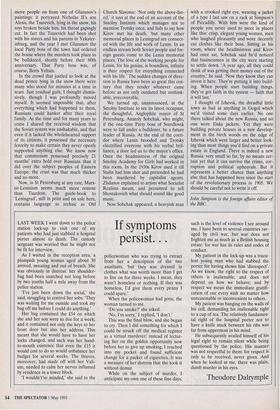BACK TO THE FUTURE
John Simpson on how he saw the
signs of the new Russia 15 years ago, but failed to understand them
St Petersburg THESE, I reflected, were the new Rus- sians: the carefully dressed woman in her forties with the lop-sided, self-deprecating smile, the grinning off-duty policeman, his shirt stretched over a generous waistline, the girl in the severe football shirt who licked her fingers every three or four bal- lot-papers she touched, the elderly, disor- ganised, donnish character with the frayed collar and the sticking-up hair. Under a ceiling overloaded with gilded cherubs and plump nude deities, they were counting the votes in Boris Yeltsin's referendum.
One or two — the donnish one specially — could remember the days of Stalin, when the notion that they might eventually be counting freely cast votes in the Sheremetevs' palace in a city once again called St Petersburg would have seemed as fantastical as the suggestion that the Sheremetevs might drive up in a droshky and take possession of the place once more.
The votes were piling up. Now the girl from one of the new radio stations in town had set down her microphone and was helping to count the votes. No one mind- ed, any more than they minded when my colleague put his television camera on the table and got a ballot-paper's eye-view of the counting process. This, too, was the new Russia: a place where people no longer instinctively stop you doing things.
Not, of course, that this was typical even of the whole of St Petersburg, let alone of the vast, drab hinterland where each iden- tical-seeming town has its Gorky Street and its Kirov Avenue, where Lenin's stat- ue still gesticulates, where the down-at- heel hotels which smell of cats have run out of tea and coffee but can still muster three uniformed policemen in the lobby, day or night. But it's a start. Not long ago the Sheremetevs' palace was the head- quarters of the Leningrad Committee for Peace and Security, and 'voting' meant doing your duty for the Party.
By now Boris Yeltsin was doing spectac- ularly well here; though one of the tellers held up a copy of ballot-paper number one: do you trust Yeltsin? `Poka', someone had written alongside that: 'for the time being'. Everyone laughed. Technically it was a spoiled paper; but it was judged a qualified 'yes', so it went onto the big pile, not the little one beside it. That wouldn't have happened a few years ago, and they'd have found out who'd written it and paid that someone a visit.
I wandered over to the grand casement and looked out. At 11 o'clock the night sky still wasn't altogether dark. The Fontanka river flowed past, as wide and regular as a canal in Venice, and reflected the perfect 18th-century mansion opposite. Not far down the street was the old Tsarist Interior Ministry, where Sipiagin and von Plehve had run such a brutally tight ship that respectable people had congratulated the parents of their assassins when they spotted them in the street. Now, apart from a few elderly Soviet cars, it was a view Anna Karenina or Raskolnikov might have recognised, and the past three-quarters of a century, terrible and repressed and gloomy by turns, had evaporated like a night mist.
Now, I realised, I had seen the signs without understanding them. In 1978, for instance, I first met the artist Ivan Glazunov, a strange operatic figure who affected a silk-lined greatcoat with an astrakhan collar, and managed to survive official disapproval because he always had the patronage of someone in a position to help him: Brezhnev's errant, blowsy daugh- ter Galina, or the precise, school-marmish Raisa Gorbachev. In 1978 Galina fixed up an exhibition for him at the Manege in Moscow. Because the old, untalented Artists' Union disapproved, there was only a small sign advertising the exhibition out- side, while a vast hoarding carried the names of the people he had to share the hall with: a clutch of safe, derivative Bul- garian landscape artists. The Manege is an oblong building, 150 yards long and 30 yards wide, and the queue for Glazunov's paintings had encircled it four times. (The Bulgarian newspapers printed photographs of the scene to show how popular their cul- ture was in the motherland of socialism.) Inside, the police had to be called to move people on from one of Glazunov's paintings: it portrayed Nicholas II's son Alexis, the Tsarevich, lying in the snow, his toys broken beside him, his throat gapingly cut. In fact the Tsarevich had been shot with his sisters and his parents in Yekater- inburg, and the year I met Glazunov the local Party boss of the town had ordered the house where the murders took place to be bulldozed, shortly before their 60th anniversary. That Party boss was, of course, Boris Yeltsin.
In the crowd that jostled to look at the dead prince lying in the snow there were many who stood for minutes at a time in tears. Just residual guilt, I thought dismis- sively, though I was profoundly moved myself. It seemed impossible that, after everything which had happened to them, Russians could hanker after their royal family. At the time and for many years to come I shared the received wisdom that the Soviet system was unshakable, and that even if it lacked the wholehearted support of its citizens, it possessed the necessary ferocity to make certain they never openly supported anything else. We know now that communism possessed precisely 21 months' extra hold over Russians than it did over the subject peoples of Eastern Europe: the crust was that much thicker and no more.
Now, in St Petersburg at any rate, Marx- ist-Leninism seems much more remote than Tsardom. The guide-book to `Leningrad', still in print and on sale here, contains language as archaic as Old Church Slavonic: 'Not only the above-list- ed,' it says at the end of an account of the Smolny Institute which manages not to mention Trotsky once, and fails to say how Kirov met his death, tut many other memorial places in Leningrad are connect- ed with the life and work of Lenin. In an endless stream both Soviet people and for- eign guests come to the Lenin memorial places. The love of the working people for Lenin, for his genius, is boundless, infinite is their respect for everything connected with his life.' The sudden changes of direc- tion in Russia have been so great this cen- tury that they render whatever came before as not only outdated but unthink- able, irrecoverable.
We turned up, unannounced, at the Smolny Institute to see its latest occupant, the thoughtful, Anglophile mayor of St Petersburg, Anatoly Sobchak, who might, if the one-time Party boss of Sverdlovsk were to fall under a bulldozer, be a future leader of Russia. At the end of the corri- dor where Lenin brooded and Trotsky electrified everyone with his verbal bril- liance, a door led us to the mayor's office. Once the headmistress of the original Smolny Academy for Girls had worked in this room. In the 1930s Kirov used it till Stalin had him shot and pretended he had been murdered by capitalist agents. Zhdanov explained to artists what Socialist Realism meant, and presumed to tell Shostakovich what should sound like good music.
Now Sobchak appeared, a heavyish man with a crooked right eye, wearing a jacket of a type I last saw on a rack at Simpson's of Piccadilly. With him were the kind of people you never used to meet in places like this: crisp, elegant young women, men who laughed pleasantly and wore decently cut clothes like their boss. Sitting in his room, where the headmistress and Kirov had once sat, Sobchak said he'd noticed that businessmen in the city were starting to settle down. 'A year ago, all they could think of was getting their money out of the country,' he said. 'Now they know they can invest it here. They're putting it into build- ing. When people start building things, they've got faith in the system — faith that it will last.'
I thought of Izhevsk, the dreadful little town as bad as anything in Gogol which we'd visited some days earlier. No one there talked about the new Russia, and no one wore Daks jackets. Yet they were building private houses in a new develop- ment in the birch woods on the edge of Izhevsk which were larger and better look- ing than most things you'd find on a private estate in England. There is indeed a new Russia: very small so far, by no means cer- tain yet that it can survive the crime, cor- ruption and political upheavals. But it represents a better chance than anything else that has happened here since the start of the revolutionary process in 1905. We should be careful not to write it off.
John Simpson is the foreign affairs editor of the BBC.



























































 Previous page
Previous page